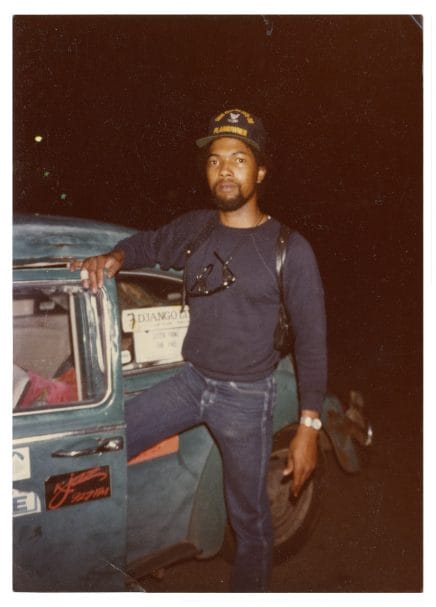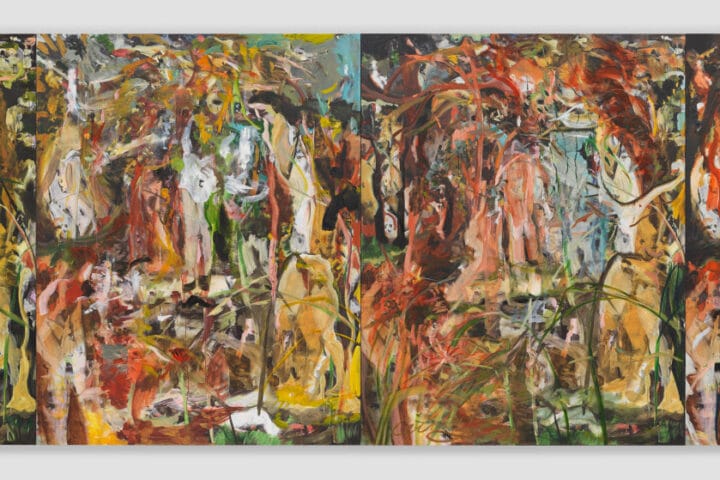The George Adams Gallery, in conjunction with the Robert Mann Gallery, is pleased to announce an exhibition of photographs by Doug Biggert. The exhibition encompasses two distinct bodies of work, each the product of years spent documenting chance encounters. The first is a series of portraits of hitchhikers Biggert has picked up on his travels, predominately along I-80 and Route 49 in Northern California beginning in the early 1970s. The second features patrons who frequented Socrates Sandal shop on West Balboa Boulevard in Newport Harbor, CA, from 1968-1972. Over forty snapshots from the Hitchhikers series – which runs to approximately 450 images over almost three decades – will be on view across both galleries. In addition, a small cross-section of the Sandal Shop images will be presented at the George Adams Gallery, along with a documentary short produced about the artist, Beautiful America, from 2008.

Starting around 1973, Biggert began hosting a twice-weekly late-night jazz program at KVMR, a radio station out of Nevada City, CA. Driving his green VW Bug on his commute to and from San Francisco and later Sacramento, he began picking up hitchhikers for company and taking informal portraits of his passengers. Biggert continued this practice for decades, keeping the photos in a binder in the VW to show his would-be subjects by way of explaining his motives. Over the years the project expanded well beyond his regular commute through the Gold Country with the result that these snapshot portraits capture not only an itinerant population of young teens, college kids, tourists and down and outers, but also the look of an evolving America from the ‘70s onward. For decades Biggert has been drawn to the margins of society; his photographic impulses have lead him to document countless examples of the kind of visual placeholders that have long signified subcultures such as graffiti, bumper stickers and hand-painted street signs. In life, as in his art, his boundless curiosity is as much the connoisseur’s as the cataloguer, where images are just one facet of the collections he has amassed. Yet while Biggert rarely sought to create a record of a time or a place, by simply being present, he offers an insight into a kind of alternative lifestyle that so defined a generation and a region.
The Sandal Shop series was Biggert’s first major photographic undertaking, consisting of mainly portraits taken at the sandal shop near Balboa Beach where he worked from about 1968 until 1972. During his tenure at the shop – employment was perhaps too strong a term – Biggert began regularly photographing customers with a Kodak Instamatic he kept on hand for just this purpose. The snapshots would then be displayed in the store, in time growing to more than 1400 images. What began as a casual pastime came to form an idiosyncratic record of life in Southern California at an inflection point of social and political change. The photographs caught the attention of Tom Garver, then director of the Newport Harbor Museum (now the Orange County Museum of Art), leading to Biggert’s first exhibition, selections from the Sandal Shop series, in 1972.
Douglas Biggert was born in Evanston, Illinois in 1941 and raised in St Louis, MO, where he attended Principia College and later graduated from Washington University. His first exposure to photography was as a child, when given a camera by his aunt though he didn’t begin photographing in earnest until he was living in California, with the Sandal Shop series. By nature a wanderer, Biggert himself first hitchhiked through the southwest as a teenager and around Europe during a summer abroad while in college. He eventually found his way to California, living first in Balboa, in Orange County, later moving to San Francisco and then Sacramento. The urge to explore never left him however. By his own admission, Biggert has visited all fifty states, in part through his own wanderlust but also through his role as the manager of global distribution of magazines for Tower Records, a position he held from 1978 until 1999. In this capacity, Biggert was hugely influential in proving distribution and exposure for a nascent Zine scene, sometimes supporting publishers directly to see an issue produced.










